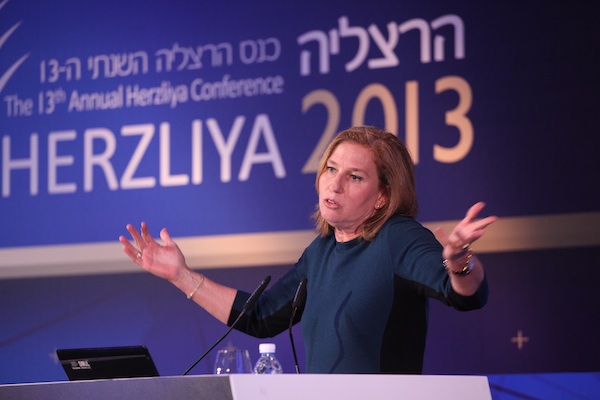With Israel and Palestine no closer to a peaceful two-state resolution 20 years after the start of Oslo, the burden of proof is on its believers, not its detractors, settler leader Dany Dayan says. Even the woman set to be in charge of any future peace process, Tzipi Livni, is speaking about the need to formulate backup plans.
Tzipi Livni, the only person in the soon-to-be-formed Israeli government who genuinely believes in the importance of the two-state peace process, splashed cold water on the prospect of it ever happening Tuesday. It’s time to start looking at alternative plans in case a two-state solution with the Palestinians proves impossible, she said.
Speaking at the Herzliya Conference, Livni said for the umpteenth time that the two-state solution is the only acceptable path for Israel.
But, and this is a big but, she admitted that it might not be a realistic goal and that Israel needs “to prepare interim measures or other measures, or unilateral ones that can lessen the damage, which can reduce the pressure a little.”
When those politicians who have dedicated much of their careers to advancing the peace process begin to express doubts about the viability of their own project, anyone who believes in those leaders and their political programs should be worried.
Former settler leader Dany Dayan drove the sentiment home, assuredly saying that “20 years after Oslo, the burden of proof is on [its] believers, not me.

The Oslo framework for a two-state solution has lost a number of long-time believers in recent months (and years). In December, Meretz chairwoman Zehava Gal-On called for cancelling the Oslo Accords, the mainstay and only lasting impact of peace talks that began 20 years go.
In its place, Gal-On called for enacting interim measures and revisiting the Arab Peace Initiative. But the API is not very different than the two-state formulation expressed in nearly every peace initiative for decades. It is so not dramatically different than Oslo, aside for the attention it pays to the refugee issue.
For Dayan, it is not about process of Oslo itself; he loves the results of Oslo. Oslo created the Palestinian Authority in order to unburden Israel of the costs of its occupation, and that is not lost on Dayan; he openly calls for strengthening the PA.
His problem is Oslo’s goal of a two-state solution: two states for two peoples. There is simply no way to reconcile the national aspirations of the Jewish and Palestinian peoples, Dayan asserts, there is no point of convergence between the two. “Any effort you make to get to that point is doomed to fail,” he said.
But in place of offering an alternative version of peace or a peace process, he embodies a realist Zionist outlook that is unacceptable to anyone who cares about equal rights, be they human, civil or political. Since he argues it is impossible for nationalist Israelis and Palestinians to find even a minimal point of convergence, the conflict should be reduced to a zero sum game – and of course the Israelis should win. To him, anything else is simply unrealistic.
Join the discussion here:


